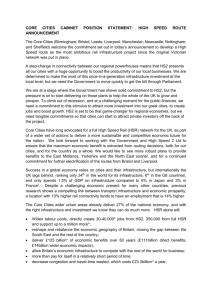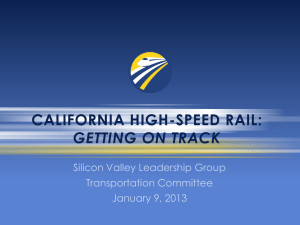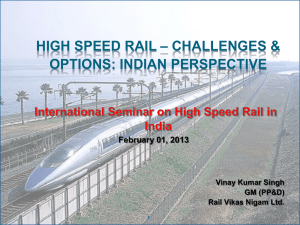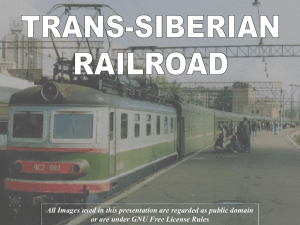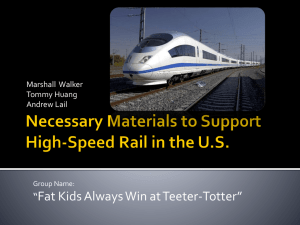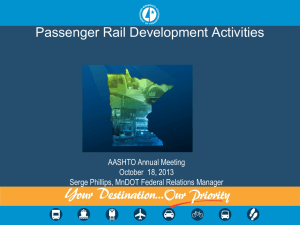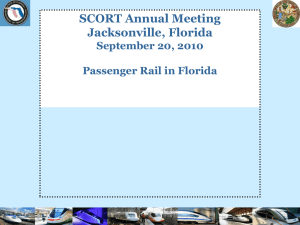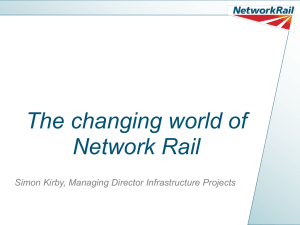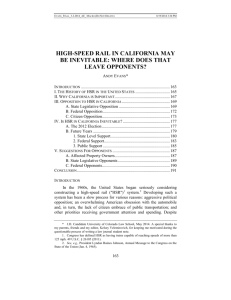Core Cities High Speed Rail Position Statement
advertisement
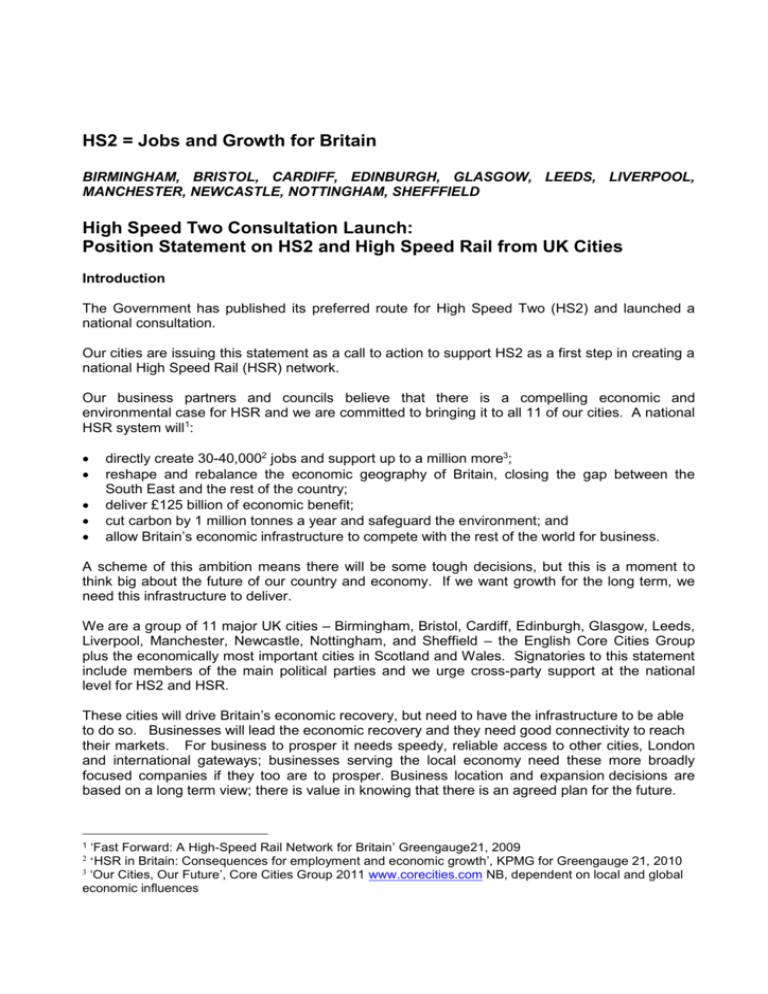
HS2 = Jobs and Growth for Britain BIRMINGHAM, BRISTOL, CARDIFF, EDINBURGH, GLASGOW, LEEDS, LIVERPOOL, MANCHESTER, NEWCASTLE, NOTTINGHAM, SHEFFFIELD High Speed Two Consultation Launch: Position Statement on HS2 and High Speed Rail from UK Cities Introduction The Government has published its preferred route for High Speed Two (HS2) and launched a national consultation. Our cities are issuing this statement as a call to action to support HS2 as a first step in creating a national High Speed Rail (HSR) network. Our business partners and councils believe that there is a compelling economic and environmental case for HSR and we are committed to bringing it to all 11 of our cities. A national HSR system will1: directly create 30-40,0002 jobs and support up to a million more3; reshape and rebalance the economic geography of Britain, closing the gap between the South East and the rest of the country; deliver £125 billion of economic benefit; cut carbon by 1 million tonnes a year and safeguard the environment; and allow Britain’s economic infrastructure to compete with the rest of the world for business. A scheme of this ambition means there will be some tough decisions, but this is a moment to think big about the future of our country and economy. If we want growth for the long term, we need this infrastructure to deliver. We are a group of 11 major UK cities – Birmingham, Bristol, Cardiff, Edinburgh, Glasgow, Leeds, Liverpool, Manchester, Newcastle, Nottingham, and Sheffield – the English Core Cities Group plus the economically most important cities in Scotland and Wales. Signatories to this statement include members of the main political parties and we urge cross-party support at the national level for HS2 and HSR. These cities will drive Britain’s economic recovery, but need to have the infrastructure to be able to do so. Businesses will lead the economic recovery and they need good connectivity to reach their markets. For business to prosper it needs speedy, reliable access to other cities, London and international gateways; businesses serving the local economy need these more broadly focused companies if they too are to prosper. Business location and expansion decisions are based on a long term view; there is value in knowing that there is an agreed plan for the future. ‘Fast Forward: A High-Speed Rail Network for Britain’ Greengauge21, 2009 ‘HSR in Britain: Consequences for employment and economic growth’, KPMG for Greengauge 21, 2010 3 ‘Our Cities, Our Future’, Core Cities Group 2011 www.corecities.com NB, dependent on local and global economic influences 1 2 We call upon the public, our private sector partners and local and national leaders of all major political parties to get behind HS2 and bring jobs and growth to Britain, and ask you to sign up to support our Pledge for Growth (http://www.highspeedrailuk.com/) and respond to the Government’s consultation. The challenge Britain faces a long term economic challenge to move into recovery and growth, competing on an international stage. Reduced funding to the public sector places an emphasis on private sector jobs and growth, which our cities can deliver. Britain needs the South East’s economic contribution, but we can also unlock greater growth elsewhere by investing in HSR. It is our cities that will drive this growth and underpin the national economy. The Core Cities and their primary urban areas alone produce 27% of England’s economic output, more than London, with Glasgow and Edinburgh home to just over 20 % of Scotland’s population but generating around 31 % of Scotland’s economic output4. They could do more with the right infrastructure in place. Our view is based on evidence, set out below. Nations across Europe are investing in HSR, and this is both a threat and an opportunity: it makes other countries a better location for investment, but it offers the prospect of getting multiplier benefits from our own investment by linking to European networks. The nation has a massive infrastructure deficit - £500billion5 over the next decade on Government estimates - and we lag behind our closest competitors. The UK ranks only 34th in the world for its infrastructure, behind Saudi Arabia and Malaysia, and 6th amongst the G8 countries6. 1.5% of UK GDP is spent on infrastructure compared to 6% in Japan and 3% in France, contributing toward France having 20% greater productivity despite its less flexible labour markets7. This is not a situation that can continue if we want to be globally competitive. The OECD states that infrastructure investment should be one of the top three priorities for the UK over the medium term. Other economies are quickly catching up and we stand to lose out in an economically critical period. The evidence A recent study by Oxford Economics8 showed that the newly designated ‘Local Enterprise Partnership’ areas around the eight Core Cities alone could produce an additional 1 million jobs and £44 billion economic output over the next two years, dependant on a number of growth factors, including infrastructure investment. A similar relative quantum of growth would in all probability be likely for Cardiff, Edinburgh and Glasgow under the right economic conditions. Congestion costs business £23.3 billion a year. HS2 is an important first step to avoiding this costly problem. An additional £125 billion in growth will result from a national HSR network. 4 Measured as Gross Value Added using NUTS 2 data st ‘Delivering a 21 Century infrastructure for Britain’, Helm, D, Wardlaw, J & Caldecott B, Policy Exchange, 2009 6 World Economic Forum’s Global Competitiveness Report (WEF 2009-2010) 7 ‘Avoiding the Infrastructure Crunch’, Association for Consultancy and Engineering, 2010 8 ‘Our Cities, Our Future’, Core Cities Group 2011 www.corecities.com 5 Carbon emissions are growing and oil prices are rising, with ‘peak oil’, the moment at which production will decline, around the corner. HSR will move 30 million journeys from other modes to rail and save 1 million tonnes of carbon, every year. Therefore HS2 is a vital first step to unlocking massive economic and environmental improvements locally and nationally, making us globally more competitive. We will shortly reach capacity on existing lines and simply upgrading what we have is not sustainable, and neither is just building more roads; there is no plan B. Investment in a national HSR network will: strengthen existing and generate new economic and business flows and interactions, worth £125billion to the economy; at £69billion, more than pay for itself in a relatively short period of time; decrease congestion and travel-time wasted, which costs £23.3billion a year, improving productivity and performance; increase rail and decrease air and car journeys by 30 million journeys a year; widen labour pools and increase employment opportunities, creating 40,000 jobs directly and supporting a million more (CHECK); provide a catalyst to improve local public transport networks; enable new business and economic flows between cities; reduce carbon emissions by 1 million tonnes a year, improve air quality and achieve targets; and bring UK infrastructure up to competitive international standards. We are calling for the UK to follow China, Spain, Japan and France - world leaders in HSR – and implement a comprehensive high speed network serving the whole of the country. A new high speed line serving the length of the UK is capable of providing capacity for 15,000 passengers an hour each way: twice the capacity of the West Coast, East Coast and Midland mainlines together. The use of double-deck trains would also increase the capacity of the line by 40%. A new highspeed line would not only significantly boost to the national infrastructure itself, but also release capacity on the existing network when long distance services transfer to the new line. This opens up the opportunity to radically to provide new services where previously there were none and to improve the quality of existing services, expanding business and employment potential through improved commuter networks. HSR and the economy HSR has the potential to radically transform the economies not just of major cities, but also of surrounding connected towns and cities, extending advantages far beyond the stations that directly serves. Ensuring that HSR is properly integrated into the classic rail and other public transport networks will mean that the maximum number of people benefit from the advantages of the network, reducing journey times for business and leisure. The regeneration benefits of HS2, the first stages of a full network, will ripple out into a much wider catchment area, creating jobs for people living in towns, villages and cities in the surrounding areas. The country’s existing rail infrastructure is currently reaching capacity; to date we have responded by upgrading what is already there. This is no longer sustainable, nor is it good value for money. Modernisation of the West Coast Mainline was due to cost £2bn, take 6 years, and deliver maximum speeds of 140mph. In fact the final scheme cost £8.8bn, took 9 years, and provided for maximum speeds of 125mph. Despite this work, the line is expected to reach full capacity by the early 2020’s, and some sections much earlier than this. In addition to the West Coast Mainline there are capacity problems on the East Coast, Midland and Great Western Mainlines. It is clear that given the strategic importance of these lines to the economy, we cannot suffer years of disruption and delay for upgrades which will not deliver what is needed, and must instead plan for a new high speed rail line which runs in addition to the existing classic network. According to The British Chamber of Commerce, congestion costs business £23.3bn a year. A full HSR network linking the major cities of the UK would cost up to £69bn and would generate over £125bn of economic benefits. These benefits are derived from improvements in journey times, and crowding, reductions in road congestion, environmental improvements and the economic benefits arising in the release of capacity on the conventional rail network. It also includes the beneficial effect on the productivity of businesses through changes to employment patterns and agglomeration effects. This is mission critical to UK PLC, seeking to compete in a global market place in the 21st Century with a currently fragmented infrastructure that will not match that of our closest economic competitors. Climate change HSR, and HS2 as a first step, has considerable and calculable environmental as well as economic advantages. At a time of increasing concern over climate change and carbon emissions, HSR has the potential to assist in the meeting of the UK’s carbon reduction and air quality targets by attracting passengers from domestic air services and private car journeys. At average loadings, high speed rail emits 30g of carbon per passenger kilometre, compared to 120g for aviation, and 105g for car (new car average) meaning that for every journey transferred from plane to rail CO2 emissions are reduced by 75%, and 71% for car to train transfers. However, rail, being electrically powered, is only as clean as its energy source; which at present is some of the most carbon intensive in Europe. The Climate Change Act 2008 committed the country to an 80% reduction in greenhouse gasses by 2050 on 1990 levels. With these proposals put it place it is conceivable that HSR could reduce its carbon output by 96% by 2055 to 1.3g of carbon per passenger kilometre. Measures to reduce the environmental impact of plane, and improvements in electric car technology could see their carbon emissions reduced to 51g for planes and 4g for car. Forecasts suggest that by 2055 a full HSR network could be carrying 30 million journeys which would otherwise be made by air, and 13 million from car journeys. This would indicate that high speed rail could deliver carbon saving of around one million tonnes per year, but a full national network is needed to create this modal shift. Journey times Evidence from elsewhere in Europe has shown that where a journey can be made in under three hours, rail can capture 50 to 60 per cent of the market from airlines – a figure that grows to 90 per cent if the journey takes less than two hours. And in a country the size of the UK, no two major cities need be more than three hours apart via high speed rail. In Europe, the introduction of a high speed service between Madrid and Seville saw rail increase its share of the market from 33% to 88%, and aviation’s share reduce from 67% to 16%; services between Paris and Brussels lead to an 108% increase in rail, a 30% reduction in car trips, and a 72% drop in plane journeys, albeit on a small original base. Whilst aviation will always have an important role in economic development; significant modal shift from plane to train will also free up slots at airports which can then be used for more valuable international journeys, reducing development requirements at and around airports, and strengthening the UK’s competitive position. Summary Our cities and business partners believe the time has come to recognise the step change in economic and environmental performance that can be brought about through high speed rail. We are supporting the implementation of HS2 as a first step toward a comprehensive high speed rail network linking all our cities, to provide the UK with the domestic infrastructure necessary to compete in the international marketplace. HSR has already demonstrably achieved the required results elsewhere in Europe and across the globe, and can work here in Britain. With HSR the goal of a united, strong and sustainable British economy, allowing growth to happen in many places and delivering benefits across the whole of the country can be realised. Although only part of the economic and environmental solution, the view of these cities is that without it we will fall short of meeting both our ambitions and our needs, and increasingly be perceived as a less attractive international business location. Yours sincerely, City Leaders Councillor Mike Whitby Leader, Birmingham City Council Councillor Barbera Janke Leader, Bristol City Council Councillor Rodney Berman Leader, Cardiff City Council Councillor Jenny Dawe Leader, Edinburgh City Council Councillor Gordon Matheson Leader Glasgow City Council Councillor Keith Wakefield Leader, Leeds City Council Councillor Joe Anderson Leader, Liverpool City Council Councillor Sir Richard Leese Leader, Manchester City Council Councillor David Faulkner Leader, Newcastle City Council Councillor Jon Collins Leader, Nottingham City Council Councillor Paul Scriven Leader, Sheffield City Council Business leaders Jerry Blackett Chief Executive of the Birmingham Chamber of Commerce Group George Cowcher Chief Executive Derbyshire and Nottinghamshire Chamber of Commerce David Wade Smith Chairman of Livesmart John Early Chair, Shadow Greater Manchester Local Enterprise Partnership James Ramsbotham Chief Executive of the North East Chamber of Commerce Group Colin Skellett, Chair, West of England Local Enterprise Partnership James Newman Chair, Sheffield City Region LEP
